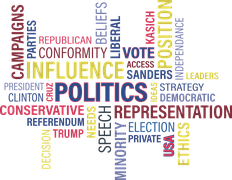 It was round two for Hillary Clinton and Donald Trump at the second presidential debate held at Washington University in St. Louis.
The atmosphere was tense as evidenced by the candidates' refusal to shake hands. But while the focus is supposed to be on the candidates, they were upstaged by Martha Raddatz, who co-moderated with Anderson Cooper. Where are the good moderators? It's been a challenge to respect the facilitators in these debates because they don't seem to understand the role of a moderator. Here are some guidelines for being an effective moderator:
It was round two for Hillary Clinton and Donald Trump at the second presidential debate held at Washington University in St. Louis.
The atmosphere was tense as evidenced by the candidates' refusal to shake hands. But while the focus is supposed to be on the candidates, they were upstaged by Martha Raddatz, who co-moderated with Anderson Cooper. Where are the good moderators? It's been a challenge to respect the facilitators in these debates because they don't seem to understand the role of a moderator. Here are some guidelines for being an effective moderator:
Ask prepared questions. The quality of the questions will impact the quality of the debate. Both Anderson and Martha asked relevant questions and invited guests to participate.
Share the spotlight. During the debate, Anderson ceded control to Martha who dominated the conversation. At times, Anderson seemed invisible. What is the point of having two moderators unless they are both contributing?
Keep control. The job of the moderator is to begin and end on time and to give equal time to both candidates. There were several times when they allowed the candidates to speak longer than the allotted two minutes. It's also the job of the moderator to keep the focus and redirect the candidate to answer the question.
Be impartial.The kinds of questions and the number of questions should not favor one candidate over another. This wasn't always the case. Trump alluded to "three on one." Skilled moderators do not show their hand. The audience should not be able to sense the preference of the moderator.
Facilitate don't participate. This is where Raddatz really blew it. A moderator asks questions but doesn't offer opinions. The purpose of the debate is to showcase the candidates- not the moderators. Facilitation skills seem to be difficult for many professionals to master. In order to be a good facilitator you need to suspend your ego and draw the conversation from the participants. A facilitator is the conductor, not the musician. Facilitation is different from interviewing and from reporting. Maybe it's time for journalists to be trained in facilitation skills.
End on a positive note. People remember the last thing they hear so you don't want to wrap up in a negative atmosphere. The moderators did a good job by allowing the last question of the evening to be "What do you admire in the other candidate?"
Who would you choose to moderate the next debate?
